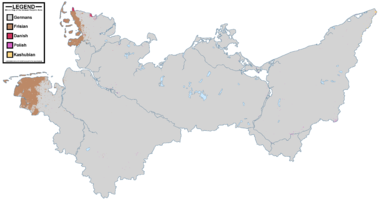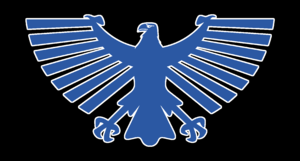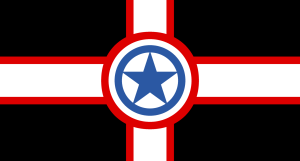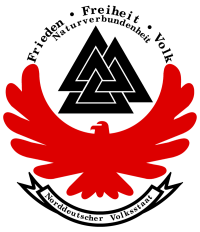North Germany, officially the North German People's State (German: Norddeutscher Volksstaat) is a northern-central European country that emerged out of the collapse of Germany and currently stands in as the de facto replacement of the German nation-state, especially on the international stage. Though it is highly isolationist, it is a member of the ![]() AltUN as well as a founding member of the
AltUN as well as a founding member of the ![]() UFNNS and
UFNNS and ![]() Nationalist International, two organisations dedicated towards preserving national sovereignty internationally. The state possesses multiple nuclear weapons as well as a extensive fallout shelter network.
Nationalist International, two organisations dedicated towards preserving national sovereignty internationally. The state possesses multiple nuclear weapons as well as a extensive fallout shelter network.
North Germany's population is in intentional rapid decline. North Germany implemented depopulation programs to not only reduce the amount of ethnic diversity in the state, but also lower the overall population in order for the envisioned rural and semi-neoluddist system, the government imagines, to take hold.
The North German state is a non-capitalist one, instead resting its economy primarily on internal as well as extremely local collectivist communitarianism with aspects of mutual aid. Trade and the use of currency are still widespread however, particularly in inter-town trade and inside the cities. The state earns money though taxes as well as state managed fully automatized industries, which produce goods that North Germany exports; the most famous of which being cars.
History
North Germany emerged out of the era in central European history commonly known as the German Collapse. The instability of the German state in the late 2020s lead to the eventual secession of Bavaria, followed by the collapse of the federal government, and eventually the secession of North Germany as well as Sorbia and southern East Germany during the Beryist revolution, which managed to take over the remaining German state.
After North German secession, a deal was made between North Germany and the new government of Poland for a land reclamation project in Pomerania which was agreed upon in the Treaty of Zgorzelec. In exchange for the Pomeranian lands, North Germany promised to recognize Poland's eastern territories and defend it from aggressors in addition to paying 85 million Euros to the Polish government.
North Germany as of today, has undergone extreme societal, demographic, and cultural change; and faced many hardships during said periods. North Germany has held two elections since independence, and achieved great progress towards the goals of the leading party.
Culture
North Germany is majority German.
Media
Public broadcasting

 Landsberg State
Landsberg StateNorth Germany's primarily source of media is via public broadcasters and their agencies. The central public broadcasting agency is the North German Broadcasting Agency (Norddeutscher Rundfunk), or NDR for short. It holds control over all national, and most regional television as well as Radio channels.
The NDR is state-owned and operated as a public broadcasting agency, while it does have to hold to certain standards, state politics and the elected government do not have any influence over public broadcasting in North Germany, and the channels understood to fall under this umbrella are fully neutral when it comes to national politics. In international politics, certain grand narratives do prevail in the broadcast, such as the evils of imperialism and the Americans; however these are attitudes reflected in the majority of the North German population anyways and fall on few critical ears, which is why even said narratives, though they are sometimes examined critically, are also viewed to be 'neutral' within the nation.
The NDR can be divided into the following categories:
- North German Broadcasting Agency
- NDR TV
- National TV channels (i.e. NDR)
- Regional TV channels (i.e. FrieslandTV)
- NDR Radio
- National Radio stations (i.e. NDR 90,3)
- Regional Radio stations (i.e. Radio Hamburg)
- NDR Inter-/Intranet
- FUNK (i.e. Politik Verstehen)
- NDR International
- International TV channels (Norddeutsche Welle)
- International Radio channels (Norddeutsche Welle)
- Others
- Some regional newspapers
- Some shows that are broadcasted elsewhere
- NDR TV
The NDR is owned 100% by the state, thereof 80% laying with the federal Government, and the rest with those regions in North Germany that have their own channels and/or subdivisions. The broadcaster's employees are supervised by a Workers' Council that is elected every 3 years.
Television

Main Article: PCBaller World/North Germany/Public Television
North German television is administered primarily by the central broadcasting agency, NDR. Some regional stations do exist (either managed by one person/family or a cooperative), but their broadcasting is strongly regulated and their range limited to a 10km radius.
The NDR administers the following channels:
- National
- NDR
- NDR Kids
- Nationalfernsehn
- Regional
- Pommern TV
- Hamburg 1
- FrieslandTV
- DithmarschenTV
Intranet and Internet
Demographics

North Germany is majority German.
Citizenship
| Citizenship | Population | % |
|---|---|---|
| 8,947,155 | 99.98% | |
| 805 | 0.009% | |
| 89 | 0.001% |
Religion
| Are you part of a religious organisation? | % |
|---|---|
| 52.7% | |
| 42.3% | |
| 4% |
Language
| First Language | % |
|---|---|
| 98.6% | |
| 0.8% | |
| 0.4% | |
| 0.1% | |
| 0.1% |
| Second Language | % |
|---|---|
| 76.9% | |
| 4.1% | |
| 3.6% | |
| 1.4% | |
| 1.2% | |
| 1.1% | |
| 1% | |
| 0.6% | |
| 0.4% | |
| 0.2% | |
| 0.1% | |
| 0.1% | |
| 0.1% | |
| 9.2% |
| Language Proficiency | % |
|---|---|
| 99.9% | |
| 83.9% | |
| 7.2% | |
| 6.1% | |
| 3.6% | |
| 2.7% | |
| 2.1% | |
| 1.3% | |
| 1.2% |
Politics
Elections
The Parliament of the North German People's State is a primarily unicarmal house under a ![]() semi-direct democratic representative
semi-direct democratic representative ![]() multi-party system. The parliament is elected every 5 years by every citizen over the age of 16.
multi-party system. The parliament is elected every 5 years by every citizen over the age of 16.
2035 North German federal election

The results of the most recent election, which was held on the 20th April 2035, is showcased in the Infobox on the sidebar.
The three biggest parties within the state are the leading ![]() LNPD, the
LNPD, the ![]() VAV, and the
VAV, and the ![]() Querfront. Thus far, no party other than the LNPD could reach a percentage of votes high enough to lead a coalition.
Querfront. Thus far, no party other than the LNPD could reach a percentage of votes high enough to lead a coalition.
Besides these three main parties, there are many minor parties within the state.
These minor parties are also able to play important roles in politics, as the huge parliament of North Germany lacks an electoral threshold. This means that a party is only required to win 0.1% of the vote to gain a seat in national parliament.
The current government has been formed between the ![]() LNPD and
LNPD and ![]() VAV, which alone formed the previous government, as well as the minor
VAV, which alone formed the previous government, as well as the minor ![]() BdN from Holstein, and the very small
BdN from Holstein, and the very small ![]() HNP.
HNP.
Some have criticized the new government for involving the regionalist BdN and the controversially radical HNP.
Government (501/1000)
 Left-National Party of Germany (352/1000)
Left-National Party of Germany (352/1000) United Agrarian People's Party (139/1000)
United Agrarian People's Party (139/1000) Peasants' Party of the North (8/1000)
Peasants' Party of the North (8/1000) Homonational Party (2/1000)
Homonational Party (2/1000)
Opposition (499/1000)
 Querfront Party (136/1000)
Querfront Party (136/1000) Conservatives (108/1000)
Conservatives (108/1000) Abrahamic Unity (93/1000)
Abrahamic Unity (93/1000) Democratic-Separatist Party (86/1000)
Democratic-Separatist Party (86/1000) Anti-Fascist Freedom Party (32/1000)
Anti-Fascist Freedom Party (32/1000) Social-Nationalist German Friendship Party (24/1000)
Social-Nationalist German Friendship Party (24/1000) Climate List Northern Germany (12/1000)
Climate List Northern Germany (12/1000) Communist Party of the North (5/1000)
Communist Party of the North (5/1000) Satanic Unity Party (2/1000)
Satanic Unity Party (2/1000) Frisian People's Party (1/1000)
Frisian People's Party (1/1000)
Democratic People's Youth

The Democratic People's Youth (German: Demokratische Volks-Jugend) is the North German political mass-movement aimed at encouraging democratic participation in the youth of North Germany as well as giving them a space to develop and discuss their opinions and ideologies. While the DVJ does not encourage a specific ideology, it rests itself on the principles on which the North German state was established; while most members agree to these principles, making it a de facto requirement for a functioning member, views that deviate strongly from the norm are allowed in the organization and can be put to the test in its environments.
The DJV is a way for young politically-interested North Germans to meet each other, form friendships, and discuss their ideas freely; while also partaking in many activities that are hosted free of charge. Membership in the DVJ is fully voluntary for those between the ages of 13 and 20, whereby the DVJ is split into two age groups: 13 to 15 & 16 to 20. These groups carry differentiating patches, but do not have any other separate insignia deviating from the DVJ logo and flag.
History of Political Parties
Iconography
Flag

The flag of North Germany is inspired by that of the North German Confederation, using the same colours.
The symbolism of the North German flag's colours are as follows:
- Black - Black is the colour of Prussia, the state in which North Germany sees itself partially rooted and which first (mostly) unified the region which today makes up the North German state.
- Red - Red represents the Hanseatic League and the historical free cities of the north more broadly. It is rarely also interpreted as representing blood, this explanation however is not official.
- White - White represents the peace which North Germany seeks with the rest of the world and between its citizen. Additionally, it represents the purity of the national spirit.
- Blue - Blue represents to two seas which North Germany borders, having severely impacted North German history, economy, and culture; they are seen as a vital part of national identity.
The North German flag uses a cross to symbolize its northern heritage and closeness to the Nordic states (See: Nordic cross) both geographically, historically, and culturally. North Germany does not claim to be Nordic however.
Red and Black border each other in order to represent the reliance many free cities historically had on Prussia and its predecessor states, representing the need for the rural and agrarian to sustain the cities, while also showcasing a bit of regional history. The white color is enclosed by Red to symbolize that the free cities in historical times, were save guarding north German peace and purity.
In the centre of the flag is shown a star encircled, it represents the unity and closeness of the nation as a collective, enclosed by the state to protect it from outside evils.
Coat of Arms

The current North German Coat of Arms was drawn up by the Emergency Iconography Commission at independence due to a lack of official Coat of Arms or seal for the time of deceleration. While officially being temporary, there is nothing more permanent than a temporary solution; thus North Germany has come to experience as well since it has not changed its Coat of Arms as originally intended.
The Coat of Arms showcases a Red eagle; it represents the German nation (continuously represented as an Eagle thought history) as well as northern Germany's Prussian history and the state of newly regained Pomerania as a sign of pride. The colour of the eagle is red; it represents the Hansa as well as the blood of those that fought for the nation. The eagle spans it wings wide, encircling the central Valknut and displaying its might.
The Valknut, the central party of the Coat of Arms, is representative of the northern German and Germanic peoples as an ancient symbol of the area. Additionally to representing the nation, it also represents a longing for return to nature and a simpler life, perhaps even Germanic Paganism.
Below the Symbols is a ribbon stating the name of the country - Norddeutscher Volksstaat (North German People's State).
Atop the eagles wings is written the Motto of the state - "Frieden, Freiheit, Volk, Naturverbundenheit", roughly translating to "Peace, Freedom, Nation, and connection to nature".
Diplomacy
North Germany is a generally neutral and isolationist state, wanting to involve itself little in the conflicts and disputes of the world, but rather just try to be left alone.
Despite this however, North Germany has a clearly east European allegiance, primarily with ![]() Poland, with which North Germany maintains very good relations, and some of its allies. North Germany holds strained relations with Sorbia due to their strong anti-German sentiment and constant threatening of war.
Poland, with which North Germany maintains very good relations, and some of its allies. North Germany holds strained relations with Sorbia due to their strong anti-German sentiment and constant threatening of war.
North Germany is a strongly anti-American state, opposing ![]() Greater Illinois and practically all its actions, as well as strongly opposing any move towards American reunification. North Germany views the American collapse is as one of the greatest events in recent history.
Greater Illinois and practically all its actions, as well as strongly opposing any move towards American reunification. North Germany views the American collapse is as one of the greatest events in recent history.
North Germany is a member state of the ![]() AltUN and the
AltUN and the ![]() Nationalist International, as well as being a founding and leading member of the
Nationalist International, as well as being a founding and leading member of the ![]() UFNNS.
UFNNS.
Diplomatic missions
| Country | Relations established | Ambassador from North Germany |
Ambassador to North Germany |
|---|---|---|---|
| ICELANDIC | |||
| WIP | EUROPEAN | ||
| WIP | SWEDISH | ||
| INDONESIAN | |||
| ILLINOISIAN |